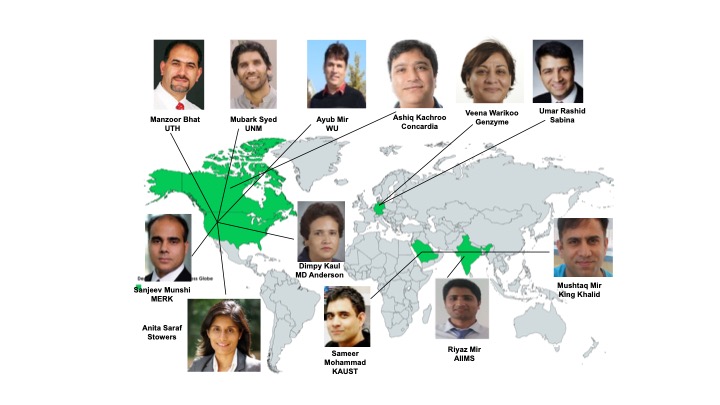About the Department
Since its establishment in 1982, the Department of Biochemistry has attained a conspicuous position in the University of Kashmir. The establishment of the department matched the growing importance of the subject, the help of biochemistry in solving many miseries, and importantly the founders of the department laid a solid foundation with a broader vision. The founders of the department were all highly experienced, motived and highly trained scientists from well-established labs across the world. The vision and mission set forth many years ago guide us to strengthen the academics and research at the department.
Academics: The department offers a two-year Masters in Biochemistry program and a five-year integrated PhD program.
It will be unfair not to mention the unparalleled contribution of our founders. Since its inception in 1982, the Department offers a 2-year MSc degree to incoming students. Students get advanced levels of theory and practical courses in various modern fields of Biochemistry. Students are also required to present recent seminars on journal papers on diverse topics. In addition, numerous co-curricular events, including annual educational trips, are organized for the overall development of the students.
The Department admits students for PhD degrees from various disciplines through a competitive institutional-level entrance examination. PhD students in the department are offered high-quality training and are encouraged to publish papers in peer-reviewed prestigious international journals, attend conferences and symposiums, present posters and actively participate in all departmental events. The faculties guide PhD students with specialized focuses on the development of molecular strategies for understanding and combating human diseases.
Every year majority of the students of the department qualify for competitive exams like CSIR-JRF, DBT-JRF, ICMR-JRF etc. The research scholars of the department get selected for highly competitive international fellowships like the Newton-Bhabha fellowship and Indo-U.S. Genome Engineering/Editing Initiative (GETin) overseas fellowship. Under these programs, the selected scholars do a part of their PhD research in the best labs in the UK and USA.
The Department receives grants under FIST from DST and various funding agencies like DST, DBT, ICMR, World cancer research fund International–UK (WCRF), etc for its research projects. The department is equipped with the state of art facilities that helps research scholars to conduct a meaningful and thorough comprehensive research. Every year the research projects submitted by the faculty members of the department are funded by different funding agencies. This helps in the continuous evolvement, progress and development of the department in terms of infrastructure, instrumentation, reagent availability etc
The Ph.D. program offers a broad education in molecular and cancer biology, and is remarkable for the scope of research it encompasses. Current areas of research include:
- Protein Biochemistry, Cancer research and epidemiology
- Regulation of the cell cycle protein-nucleic acid interactions
- Genomic instability and ubiquitin biology
- Protein structure and function
- Mechanisms of signal transduction and molecular dynamics.
Despite the diversity of their interests, researchers in the program are unified by a common desire to understand biological phenomena at the molecular level, whether through the use of genetic, biochemical or biophysical approaches.
Appeal: The department's human resources contribute to the R&D at the top-notch institutions of the country.

Global Appeal: Our alumni spread all across the globe contribute significantly to R&D.

Faculty
Prof. Shajrul Amin
Shajrul Amin is Professor in Biochemistry. She is involved in teaching graduate students and has at least 20 years of teaching experience. She also serves as a research mentor and mentors research scholars about medicinal drug discovery and plant-based drug design. Her work focuses on understanding how plant extracts at a molecular level, playing critical roles in controlling and prevention of diseases in particular metabolic disorders (Diabetes and Polycystic ovarian syndrome) and cancer. She uses that information to develop new drug therapies. She has trained over 20 graduate students, Ph.D. students and postdoctoral students who have gone on to teach graduate students of colleges/medical colleges as well as students who have make successful careers in academia and industry and who are involved in biomedical research.
http://biochemistry.uok.edu.in/Main/ProfilePage.aspx?Profile=077
Prof. Nazir Ahmad Dar
Nazir Ahmad Dar is Professor in Biochemistry and is currently serving as head of the department. He is expert in Molecular biology and Cancer biology. He is teaching biochemistry to the graduates from almost 17 years and has mentored at least 15 graduate and Ph.D students who are working in different research institutions worldwide. His overarching aim is to get deeper insights into etiology and the processes of carcinogenesis, which may help, in its prevention, identification of new drug targets or in the improvement in the prognosis. Currently, his lab is working on unraveling the new drug targets involved in regulatory pathways of cancer. He also has immensely worked, contributed and has deep knowledge on the prognosis and etiology of esophageal cancer.
http://biochemistry.uok.edu.in/Main/ProfilePage.aspx?Profile=078
Dr Shaida Andrabi
Shaida Andrabi is working as an Assistant Professor at Department of Biochemistry. He is teaching biochemistry from past 15 years and has mentored both graduate and Ph.D students during this time.
His research efforts are focused on understanding the molecular mechanisms that lead to cellular transformation, ultimately leading to cancer. He also studies the role of various oncogenes and tumor suppressors that regulate cell cycle progression. He combines various genetic, biochemical, molecular and cell biology approaches to identify the cellular proteins that allow the “abnormal cells” to repair anomalies and overcome apoptosis. In addition, his lab also studies the role of kinases and phosphatases in the regulation of cell division (particularly mitosis), apoptosis/ cell survival and resistance against cell death during tumorigenesis.
http://biochemistry.uok.edu.in/Main/ProfilePage.aspx?Profile=079
Dr. Mohd. Ashraf Dar
Mohd. Ashraf Dar has been working as Scientist-D at the Department of Biochemistry since 2015. He received his Ph.D. degree from Jawaharlal Nehru University, India and Post doctoral training from the USA. He has published his work in reputed international journals. He is teaching biochemistry in the department for the past 8 years and has mentoring graduate and PhD students. He is particularly intrigued to explore the biology of the cell cycle, DNA damage response, apoptosis and autophagy. He is also studying the regulatory mechanism underlying the Ubiquitin-proteasome system and its role in apoptosis and autophagy.
http://biochemistry.uok.edu.in/Main/ProfilePage.aspx?Profile=0528
Research contribution
The department right from its establishment has significantly contributed in the science field.
Cancer Biology
Prof. Maqsood Siddiqi being an eminent cancer research scientist had studied the role of diet and food stuffs in the human esophageal cancer in the Kashmir valley. He along with Dr. Nazir Ahmad Dar has studied different genetic markers so as to develop and study their influence in determining the treatment response for esophageal and Breast Cancer. Dr Nazir is currently working on unraveling the new drug targets involved in regulatory pathways of cancer.
Dr Shaida Andrabi examines the role of various oncogenes and tumor suppressors that regulate cell cycle progression in cancer. He is also working on the role of kinases and phosphatases in the regulation of cell division (particularly mitosis), apoptosis/ cell survival and resistance against cell death during tumorigenesis.
Plant medicine and Toxicology
Prof Akbar Masood has worked on plant extracts and their effects on treatment of different diseases. He has also contributed in the field of environmental biochemistry, phytotoxicology, protein biochemistry, enzymology, and bioinformatics.
Prof Mohammad Afzal Zargar has contributed in the field of Cancer biology, Toxicology and Medicinal plants.
Prof Bashir Ahmad Ganai has contributed in the field of Enzymology and Plant medicine. His major study interests are on enzyme purification and biochemical characterization. In recent years, he has studied essential oils, antioxidant activity, natural product chemistry and medicinal Plants.
Prof Rabia Hamid has also worked on discovery of new/novel molecules from plants as a potential source of drugs for the treatment of various diseases. Her areas of thrust are free radical biology, cancer biology, cancer pharmacology, diabetes, atherosclerosis, wound healing, inflammatory and microbial diseases.
Prof Shajrul Amin has also contributed in the field of medicinal drug discovery and plant-based drug design.
Reproductive Medicine
Prof Shajrul Amin has also contributed in the genetic epidemiology of polycystic ovarian syndrome (PCOS) and how natural products can be used to ameliorate PCOS and insulin resistance in polycystic ovary syndrome patients.
Genomic instability and ubiquitin biology
Dr. Mohd. Ashraf Dar is studying the regulatory mechanism underlying the Ubiquitin-proteasome system and its role in the cell cycle and DNA damage response.
Vision
Vision: To Transform the Department of Biochemistry into an international centre for studies in advanced biology.
Mission: To nurture and create versatile human resources in biology through excellence in knowledge creation and dissemination